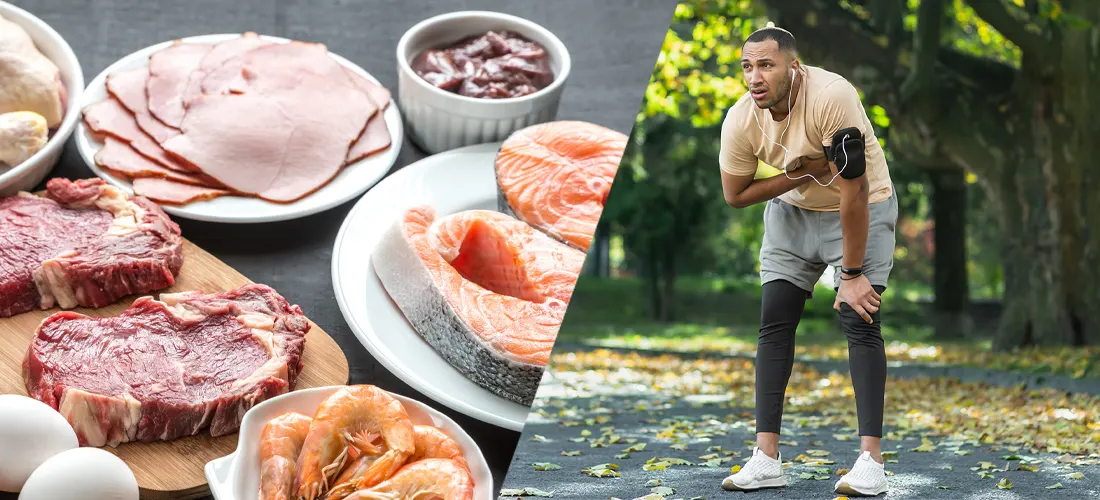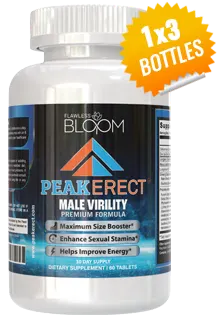Overview
Testosterone, the key male sex hormone, plays a vital role in muscle building, libido, and overall health. Many men worry about maintaining healthy testosterone levels, and readily available information online can be confusing.
You might come across articles claiming certain foods “kill” testosterone, leaving you wondering what’s safe to eat.
This article aims to separate fact from fiction. We’ll explore four commonly cited “testosterone-killing” foods based on recent scientific research.
It’s important to understand that diet plays a role, but some claims may be exaggerated. We’ll look into the evidence regarding these 4 foods that may lower your testosterone:
- Processed Meats
- Soy-Based Products
- Flaxseed
- Alcohol
By exploring the science behind these foods, we can provide a clearer picture of their potential impact on testosterone levels.
How Does Diet Affect Your Testosterone Levels
Your diet plays a significant role in maintaining optimal testosterone levels. Excessive consumption of processed foods, sugary drinks, and unhealthy fats can contribute to inflammation & can have negative impacts on testosterone production.
Conversely, a balanced diet rich in whole, unprocessed foods, fruits, vegetables, lean proteins, and healthy fats can support overall health and indirectly benefit testosterone levels.
A study published in the Journal of Clinical Endocrinology & Metabolism (2020) found that men who followed a “Western” diet high in red meat, fried foods, processed snacks, and sugary drinks over nine years experienced a significant decline in testosterone levels and sperm count.
In fact, their sperm counts were up to 42 million lower than those who followed a more healthful diet of fish, chicken, vegetables, fruit, and water.
Additionally, ensuring adequate intake of essential nutrients like zinc, vitamin D, magnesium, and omega-3 fatty acids is crucial for testosterone synthesis and regulation. These nutrients will help you to keep a healthy hormonal balance.
What are the top 4 testosterone-killing foods?
 Testosterone Killing Food VS Testosterone Booster Food
Testosterone Killing Food VS Testosterone Booster FoodProcessed Meats
We all enjoy a tasty hot dog at a ballgame, but it’s important to recognize that processed meats may be doing more harm than good. Hot dogs, sausages, and bacon are often packed with unhealthy fats, including saturated and even trans fats.
These types of fats can trigger significant inflammation in the body, which may disrupt hormone balance and negatively impact testosterone levels. Research supports the idea that high consumption of processed meats is associated with lower testosterone levels.
For example, a study published in the Asian Journal of Andrology examined the dietary patterns of over 200 men in Spain and found that those with a higher intake of processed meats experienced adverse effects on their hormone levels and testicular function.
It’s not just the unhealthy fats that are concerning. Many processed meats contain preservatives and additives that could further interfere with hormonal health.
A 2014 study indicated that diets high in trans fats, often found in processed foods, may lower testosterone levels while also contributing to systemic inflammation, which is another factor that can negatively affect testosterone production.
If you are concerned about maintaining healthy testosterone levels, it is a good idea to limit the intake of processed meats and explore healthier alternatives.
A balanced diet rich in whole foods, including lean proteins and healthy fats, may support better hormonal health.
Soy-Based Products
If you’re looking to manage your testosterone levels, you might want to pay attention to your soy consumption. Some research suggests that eating a lot of soy products—such as tofu, soy milk, and miso—may lead to a decrease in testosterone levels.
A small study involving 35 men found that those who consumed soy protein isolate for over 50 days experienced a drop in testosterone levels, raising concerns about the effects of soy on male hormones.
One reason soy might affect testosterone is its high content of phytoestrogens, which are plant-based compounds that can mimic estrogen in the body. This hormonal mimicry may disrupt the balance of testosterone.
While some studies point to potential negative impacts on testosterone levels, the research landscape is mixed. For instance, a handful of isolated case studies have indicated that consuming soy could lower testosterone levels.
One specific study noted that men who drank 20 grams of soy protein isolate per day for two weeks had lower testosterone levels compared to those who consumed whey protein isolate or a placebo.
However, a large number of randomized controlled trials and meta-analyses suggest that the impact of soy on testosterone levels is not clinically significant.
A 2021 review published in *Critical Reviews in Food Science and Nutrition*, which examined 417 observational studies and clinical trials, concluded that isoflavone intake from soy foods did not affect testosterone, estrogen, sperm, or semen levels in men.
Additionally, a 2021 meta-analysis of 38 clinical studies reached a similar conclusion, indicating that long-term consumption of soy does not lead to meaningful changes in testosterone levels.
If you are concerned about maintaining healthy testosterone levels, it may be wise to moderate your intake of soy products.
Flaxseed
Flaxseed’s been hailed as a superfood, and for a good reason – it’s packed with fiber and those heart-healthy omega-3s. But when it comes to testosterone, flaxseed might have a dark side.
Some early research raised eyebrows by suggesting flaxseed could lower testosterone levels in men with prostate cancer. However, more recent studies on healthy guys haven’t found the same effect. So what’s the deal?
Turns out flaxseed contains lignans, compounds that can bind to your testosterone and flush it out like a system cleanse. In a small study, 25 men with prostate cancer followed a low-fat diet with added flaxseed. Researchers noticed significant decreases in both total and free testosterone levels.
But before you chuck your flaxseed, remember – this effect seems most pronounced in men who already have wonky hormone levels. For most healthy dudes, moderate flaxseed consumption is unlikely to tank your T.
Alcohol
A study published in the Current Drug Abuse Review found that heavy drinkers had lower testosterone levels compared to non-drinkers. Additionally, acute alcohol intoxication has been associated with temporary declines in testosterone levels.
Another recent study suggests that testosterone levels can decline within three days of daily alcohol consumption and may reach levels comparable to those of alcoholic men after 30 days.
One of the ways alcohol can affect testosterone is by promoting inflammation. Inflammation can disrupt the function of Leydig cells, which are responsible for producing testosterone. Excessive alcohol intake can also disrupt the hypothalamic-pituitary-adrenal (HPA) axis, a pathway involved in stress response and hormone regulation.
Excessive drinking is defined as:
- 15 or more drinks per week for men
- 8 or more drinks per week for women
- Binge drinking sessions of 5 or more drinks for men, 4 or more drinks for women
A moderate, healthier intake of alcohol is considered to be:
- At most, 2 drinks per day for men
- At most, 1 drink per day for women
FAQs
What is the normal range of Testosterone levels in adult males?
According to the Cleveland Clinic, the normal range of testosterone in males is 193 to 824 ng/dL.
What foods raise testosterone?
Some foods like eggs, fatty fish, and leafy greens include nutrients to support the production of healthy testosterone. But it’s not like some single magic food is going to boost T-levels.
How would I know if I have low testosterone?
The signs are low libido, fatigue, mood changes, and issues while building muscles; however, you will only find out for sure by having blood tests ordered by a doctor.
Can vegetarians or vegans maintain healthy testosterone levels?
Absolutely! While some, especially soy-rich, plant-based diets are said to have an influence on testosterone, a well-balanced vegetarian or vegan diet really can work in support of healthy hormone levels. Focus on getting enough zinc for overall sexual health, vitamin D for ED, and other important supplements.
Does coffee have an impact on testosterone levels?
That relationship is kind of complex: some studies indicate that moderate coffee consumption might raise testosterone a bit, and others find no effect. As in so much of life, moderation seems to be a key.
How soon after dietary changes can one expect changes in testosterone levels?
Results will vary among people, but usually, changes in the level of hormones may start showing up within some weeks to a few months from when one starts with considerable dietary changes. However, the paramount is the carrying out of such long-term maintenance.
Any supplements that can help to naturally drive testosterone?
Zinc, vitamin D, and D-aspartic acid alike show a bit of potential in aiding in driving wholesome testosterone levels. Always consult with a health professional before taking any new supplement.
Does stress affect the testosterone level?
Yes, it can considerably lower your testosterone level. Although not directly linked to food, controlling your stress through meditation, exercise, and a balanced diet helps in maintaining the level of testosterone in the body.
Conclusion
So, we have singled out the top four foods that cut testosterone. The excess consumption of processed meats is what one should be mindful of, with too many soy products and the intake of flaxseed and alcohol highly developmental with regard to the hormonal makeup.
All these foods do not necessarily have to be eliminated but can be at least controlled in intake to maintain healthy testosterone levels.
On the other hand, the addition of nutrient-dense foods that will promote the production of testosterone in your body, such as fatty fish, eggs, green vegetables rich in leafy areas, and oysters rich in zinc, can be a step in the right direction.
The bottom line, however, is the fact that what puts your testosterone level in the right range is your whole lifestyle—from diet and exercise to how you sleep and handle stress.
If you’re concerned about your testosterone, see a doctor. He’ll give you personal advice, and if he has to, run tests to see where your hormone levels are.
Remember, supporting your body’s natural testosterone production by avoiding foods that decrease testosterone is more than just keeping clear of some foods; it is about nourishing your body with a balanced diet and healthy lifestyle choices.
By simply keeping in mind what you eat and how you live, you’ll take giant steps to optimize your health and feel your very best.




